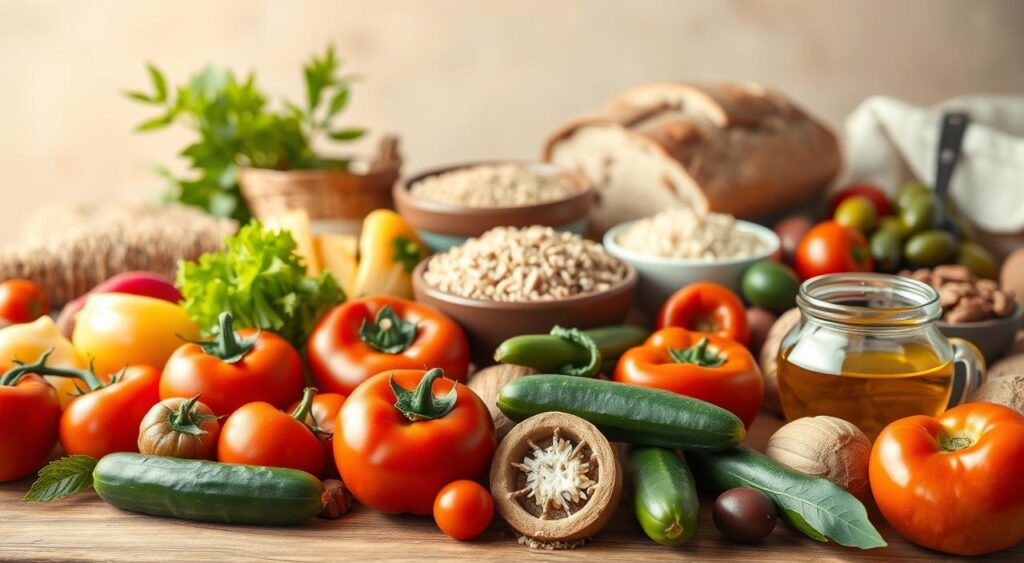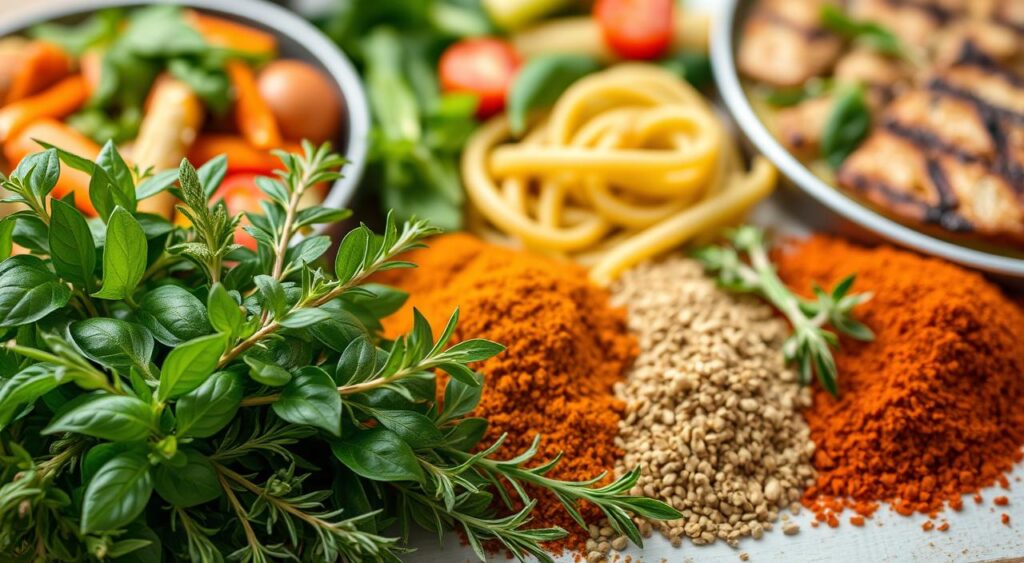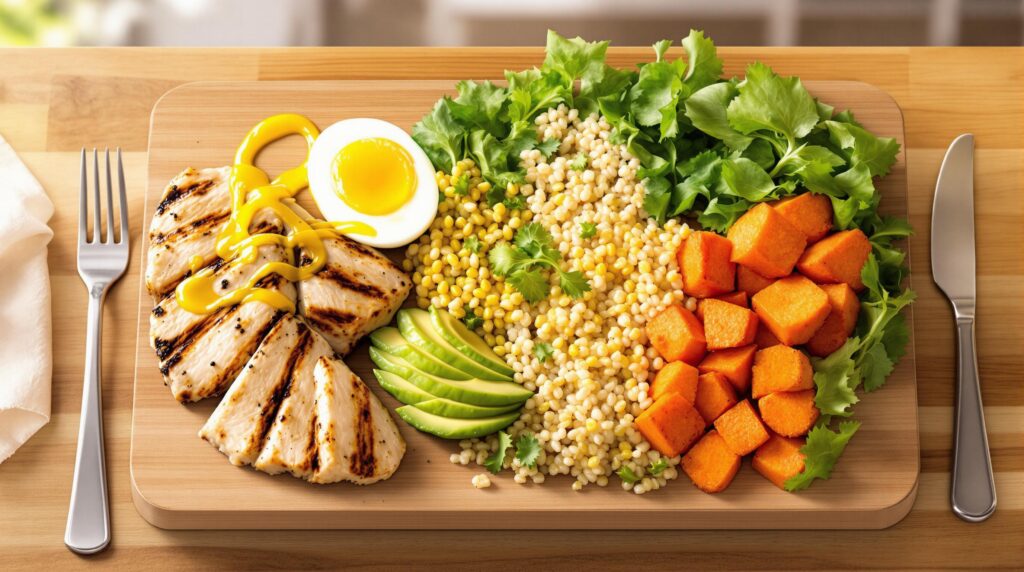Ever wondered why experts love the Mediterranean diet for heart health? It’s not just a trend. It’s a lifestyle filled with tasty, heart-friendly foods. This diet focuses on whole foods, healthy fats, and lean proteins.
In this article, we’ll dive into the key Mediterranean diet grocery list for heart health. We’ll show you the best foods to pick for your meals. Get ready to choose foods that are good for your heart and delicious too!
Why the Mediterranean Diet is Heart-Healthy
The Mediterranean diet is great for your heart. It’s full of natural, nutrient-rich foods. This makes it easy and tasty to stay healthy.
Knowing what’s in the Mediterranean diet can make you want to stock up on healthy foods. These foods are key to keeping your heart strong.
Key Components of the Diet
This diet focuses on a few main things to help your heart. Let’s explore what makes it so good for you:
- Healthy fats: Foods like olive oil, nuts, and avocados are essential. They give you good fats.
- Fruits and vegetables: Eating a variety of these gives you lots of vitamins and antioxidants.
- Whole grains: Foods like quinoa and whole wheat bread give you energy and fiber.
How It Benefits Your Heart
Studies show the Mediterranean diet is amazing for your heart. It can lower your cholesterol and reduce inflammation. This diet has been linked to fewer heart problems.
Some research says it could cut down heart issues by up to 30%. With benefits like these, it’s easy to see why people love this diet.
Core Food Groups to Include
Learning about the Mediterranean diet’s core food groups helps you make meals that are good for your heart. This diet focuses on healthy fats, whole grains, and a variety of fruits and vegetables. These foods are the base of this tasty diet.
Healthy Fats: The Stars of the Show
Healthy fats are key in the Mediterranean diet. Olive oil is a top choice, full of monounsaturated fats that are good for your heart. Avocados and nuts also add flavor and nutrients, helping you feel full.
Whole Grains for Energy
Whole grains like quinoa, brown rice, and barley are essential. They give you lasting energy without raising your blood sugar. Eating whole grains keeps you energized all day.
Fruits and Vegetables Rich in Nutrients
Fruits and vegetables are the heart of a Mediterranean diet. They’re full of vitamins, minerals, and antioxidants that are good for your heart. Try to eat a variety of colorful, seasonal produce for the best health benefits.

| Food Group | Examples | Benefits |
|---|---|---|
| Healthy Fats | Olive oil, avocados, nuts | Support heart health, keep you full |
| Whole Grains | Quinoa, brown rice, barley | Provide sustained energy, stabilize blood sugar |
| Fruits and Vegetables | Leafy greens, berries, tomatoes | Rich in vitamins, minerals, and antioxidants |
Lean Proteins for a Balanced Diet
Adding lean proteins to your Mediterranean diet boosts heart health. These proteins are full of nutrients and low in saturated fats. Let’s look at the top picks for fish, poultry, and plant-based proteins.
Fish: The Best Choices for Your Heart
Fatty fish are key Mediterranean diet foods because of their omega-3 fatty acids. These acids are great for your heart. Here are some top fish to try:
- Salmon
- Sardines
- Mackerel
Adding these fish to your diet can make your meals both tasty and healthy.
Poultry vs. Red Meat
Choosing poultry over red meat is smart for heart health. Chicken and turkey have less fat than beef or pork. Adding lean chicken or turkey to your meals is a great way to boost flavor and health.
Plant-Based Proteins to Consider
Plant-based proteins are vital for a heart-healthy diet. Beans, lentils, and chickpeas are high in protein and fiber. They add nutrients to your diet and support heart health.

Dairy: Finding the Right Balance
Dairy can be a great part of your Mediterranean diet for heart health. It’s important to choose the right types to get the most benefits without too much fat. Here are some tips to pick the best dairy for your heart.
Choosing Healthy Dairy Options
When adding dairy to your diet, go for lower-fat options that are good for you. Greek yogurt is a top choice, full of protein and probiotics for your gut. Low-fat cheeses like feta or part-skim mozzarella add taste without too much fat.
Choosing these options helps your heart and keeps your meals tasty.
Alternatives to Traditional Dairy
If you don’t like dairy, there are many plant-based options that are good for your heart. Almond milk and soy milk are great substitutes, often with calcium, vitamins D, and B12. They add variety to your diet and keep it healthy and tasty.

Herbs and Spices to Enhance Flavor
Herbs and spices are key to Mediterranean diet recipes for heart health. They make your food taste better and help your heart. Using these natural ingredients helps you use less salt, making your meals tasty and healthy.
Common Herbs to Stock
- Basil: An aromatic herb that pairs well with tomatoes and vegetables.
- Oregano: A staple in Mediterranean cuisine, great for seasoning meats and sauces.
- Parsley: Adds freshness to dishes and is perfect as a garnish.
- Thyme: Excellent for enriching the flavor of roasted vegetables and meats.
- Rosemary: A strong, fragrant herb ideal for grilling and roasting.
The Health Benefits of Spices
Spices are great for heart health. Many have anti-inflammatory properties, which is good for your heart. For instance, turmeric has curcumin, which is very beneficial. Cinnamon helps control blood sugar, which is good for your heart.
Here’s a look at some key spices to consider:
| Spice | Health Benefit |
|---|---|
| Turmeric | Contains anti-inflammatory properties, promoting heart health |
| Cinnamon | Can help regulate blood sugar and improve heart health |
| Ginger | May reduce inflammation and aid digestion |
| Garlic | Known to lower blood pressure and cholesterol levels |
| Cayenne Pepper | Might improve circulation and has antioxidant properties |

Snacks You’ll Love on the Mediterranean Diet
Embracing the Mediterranean diet doesn’t mean you have to skip snacks. There are many heart-healthy options that satisfy your cravings and keep you nourished. Snacks rich in nutrients and healthy fats are key to a balanced diet.
Nut and Seed Options
Nuts and seeds, like almonds, walnuts, and sunflower seeds, are great snacks. They offer healthy fats and protein, which curb hunger. Try mixing them into energy bites or roasting them for a tasty treat. Seasoned chickpeas are also a crunchy, protein-rich snack.
Whole Grain Snack Ideas
Whole grains can be turned into tasty snacks that are good for your heart. Try whole grain pita chips or crackers with hummus for a creamy dip. Making these snacks at home is easy and keeps you energized without unhealthy cravings. For more Mediterranean snack ideas, see this guide.
| Snack Type | Benefits | Examples |
|---|---|---|
| Nuts | Healthy fats, proteins | Almonds, walnuts, pistachios |
| Seeds | Rich in vitamins, minerals | Sunflower seeds, pumpkin seeds |
| Whole Grains | Fiber, sustained energy | Whole grain pita chips, crackers |
| Fruits | Vitamins, natural sweetness | Dates, raisins, peaches |
Cooking Oils: The Healthiest Choices
Choosing the right cooking oils is key for heart health and enjoying the Mediterranean diet’s flavors. Your shopping list should include oils that taste great and offer health benefits.
Olive Oil as a Staple
Olive oil is the heart of the Mediterranean diet. It’s full of good fats and antioxidants. These help your heart by reducing inflammation and lowering bad cholesterol. Adding extra virgin olive oil to your list is a great idea, for cooking or dressing salads.
Other Heart-Healthy Oils
Don’t forget to add other healthy oils to your kitchen. Avocado oil is rich in heart-healthy fats. Flaxseed oil, with its omega-3 fatty acids, also offers great health benefits. These oils add different flavors to your meals, keeping you on track with the Mediterranean diet.
Beverages That Support Heart Health
Choosing the right drinks is key to getting the most from the Mediterranean diet for heart health. Water is the top choice for staying hydrated. It supports your body’s functions without adding sugars or empty calories. Your body loves water, making it vital for heart health.
Red wine is also good for the heart, thanks to its antioxidants. Drinking it in small amounts can help lower heart disease risk. If you don’t drink alcohol, try herbal teas or grape juice. They offer heart-healthy antioxidants and flavors, fitting well with the Mediterranean diet.
It’s important to pick drinks that are good for your heart. For more on this, check out this link. Choosing wisely will make your Mediterranean diet journey better.
Meal Prep Tips for the Mediterranean Diet
Meal prep is key to following the Mediterranean diet. It helps you have all the ingredients for heart-healthy meals ready. This way, you can avoid unhealthy choices and stay on track with your diet.
Planning Your Shopping Trips
Before you go shopping, make a list of what you need. This saves time and makes sure you get all the right foods. Here are some tips:
- Choose a day each week for grocery shopping.
- Make a detailed list by food group.
- Check your pantry for things you already have.
- Buy seasonal produce for freshness and savings.
Creating Balanced Meals
Every meal should have a mix of food groups for best nutrition. Aim for a plate with healthy fats, lean proteins, whole grains, and lots of fruits and veggies. Here’s how to do it:
- Start with whole grains like brown rice or quinoa.
- Add a protein source, like grilled chicken or chickpeas.
- Include a big portion of colorful veggies.
- Use olive oil or nuts for healthy fats.
Budgeting for Mediterranean Diet Groceries
Smart budgeting for groceries lets you enjoy healthy meals without spending too much. A good Mediterranean diet shopping list helps you buy what you need while keeping costs down. Here are some tips to shop smart and save money.
Tips for Shopping on a Budget
- Plan your meals for the week to avoid impulse buys.
- Stick to your Mediterranean diet shopping list to stay on track.
- Buy in bulk for items like grains and legumes, which are cheaper.
- Use coupons and promotions to save on fresh produce and dairy.
- Choose store brands for lower prices without sacrificing quality.
Seasonal Shopping Benefits
Buying seasonal fruits and vegetables boosts flavor and saves money. Seasonal produce is fresher and more nutritious. Make sure to add seasonal items to your Mediterranean diet shopping list for better deals. Here’s a quick guide to seasonal produce:
| Season | Fruits | Vegetables |
|---|---|---|
| Spring | Strawberries, Cherries | Asparagus, Spinach |
| Summer | Peaches, Watermelon | Zucchini, Tomatoes |
| Fall | Apples, Pears | Brussels Sprouts, Pumpkins |
| Winter | Citrus Fruits, Pomegranates | Kale, Root Vegetables |
Conclusion: Making Heart-Healthy Choices
Choosing a heart-healthy Mediterranean meal plan is more than a trend. It’s a lasting choice that boosts your health and life span. You’ve learned how to make a Mediterranean diet grocery list for heart health. This list includes foods that are good for your body and heart.
With fruits, whole grains, healthy fats, and lean proteins, you’re set to make tasty meals. These meals can improve your health and well-being.
Remember, small, thoughtful choices can make a big difference over time. Start using the Mediterranean diet in your daily life. Celebrate your progress toward better heart health.
You now have the knowledge and tools to make better food choices. These choices can change your eating habits and improve your health.
Begin your Mediterranean diet journey today! Every meal is a chance to care for your body and enjoy healthy flavors. Your heart will be grateful for every step toward a healthier life. Enjoy the journey of a heart-healthy Mediterranean diet.




Pingback: Mediterranean Diet Foods List for Heart Health: What to Eat to Lower Cholesterol Naturally
Pingback: Mediterranean Diet Foods List: 30 Staples You Can Find at Any Grocery Store